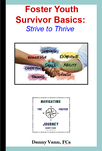
The foundation for successful family foster care requires that child welfare agencies have a Model of Practice. This means that everyone working with foster parents is trained to respect and implement the agency’s mission according to their job descriptions and use the same strengths based language. For example, we do not use the word “home” but instead “family” because it is not homes that heal or hurt children but the families living there that do. We no longer use the word “case,” replacing it with “child” or “family” or “parent” because cases do not have feelings. All agency staff who interact with foster parents must be consistent in their work. This includes staff who recruit and engage, facilitate preservice training, do the mutual family assessments (home studies), match children and families, and provide ongoing teamwork to ensure the state and federal requirements of Safety, Well-being, and Permanency. As Dr. Martin Luther King, Jr. stated, it’s essential to do the right thing and do things right.
According to the CWLA PRIDE Model of Practice to Develop and Support Foster and Adoptive (Resource) Parents as Team Members in Child Protection and Trauma Informed Care of Children, our focus must be to “minimize trauma and maximize teamwork.” This approach can be enhanced by following ethical codes of practice and behavior. For example:
National Association of Social Workers.
- Being competent
- Having dignity
- Having integrity
- Committing to the importance of relationships
- Providing service
- Being an advocate (www.socialworkers.org/NASW Code of Ethics)
Foster Parent Code of Ethics
- Recognizing the rights of children and youth to safe, nurturing relationships, intended to last a lifetime;
- Assisting parents to regain custody or make alternative plans, intended to be permanent, for their children and youth;
- Emphasizing the developmental needs of children and youth.
- Providing all children with foster parents and agency representatives who have the skills to support the children’s safety, developmental, and permanency needs, and provides those foster parents and agency staff with the supports necessary to develop and use these skills.
- Designing family foster care as a part of a comprehensive, coordinated, inter-disciplinary service delivery system.
- Providing legal representation to ensure timely and skillful responses to case plans involving court proceedings.
- Collecting, analyzing, and disseminating accurate and relevant data about children, youth, and their families leading to informed policies, programs, and practices;
- Supporting family foster care – and all child welfare services – with effective and accountable leadership in city halls, governors’ offices, national organizations, the judiciary, the federal government, Congress, and the White House.
Please join the National Foster Parent Association (NFPA) in partnership with the Texas Foster Family Association (TFFA) at “Deep and Bright” – Deep in the Heart of Texas - the annual National Education Conference in Houston from June 21-24. This is an inclusive conference in which our focus on education, networking, and advocacy also welcomes kinship caregivers and adoptive parents. For more information about the National Foster Parent Association, please visit:
www.nfpaonline.org and see our new vision and mission statements!
Developed by National Foster Parent Association Board of Directors members:
Eshele Williams, PsyD, LMFT and Eileen Mayers Pasztor, DSW


 RSS Feed
RSS Feed